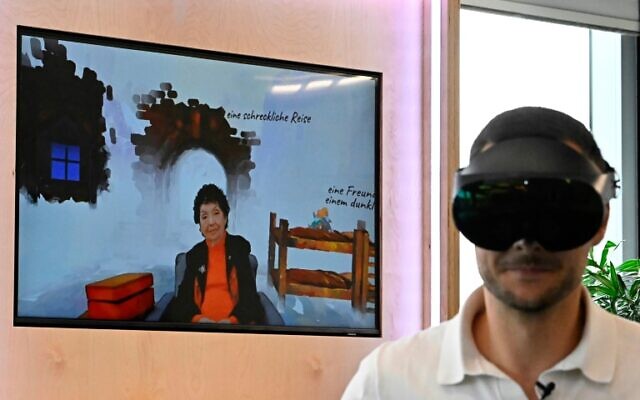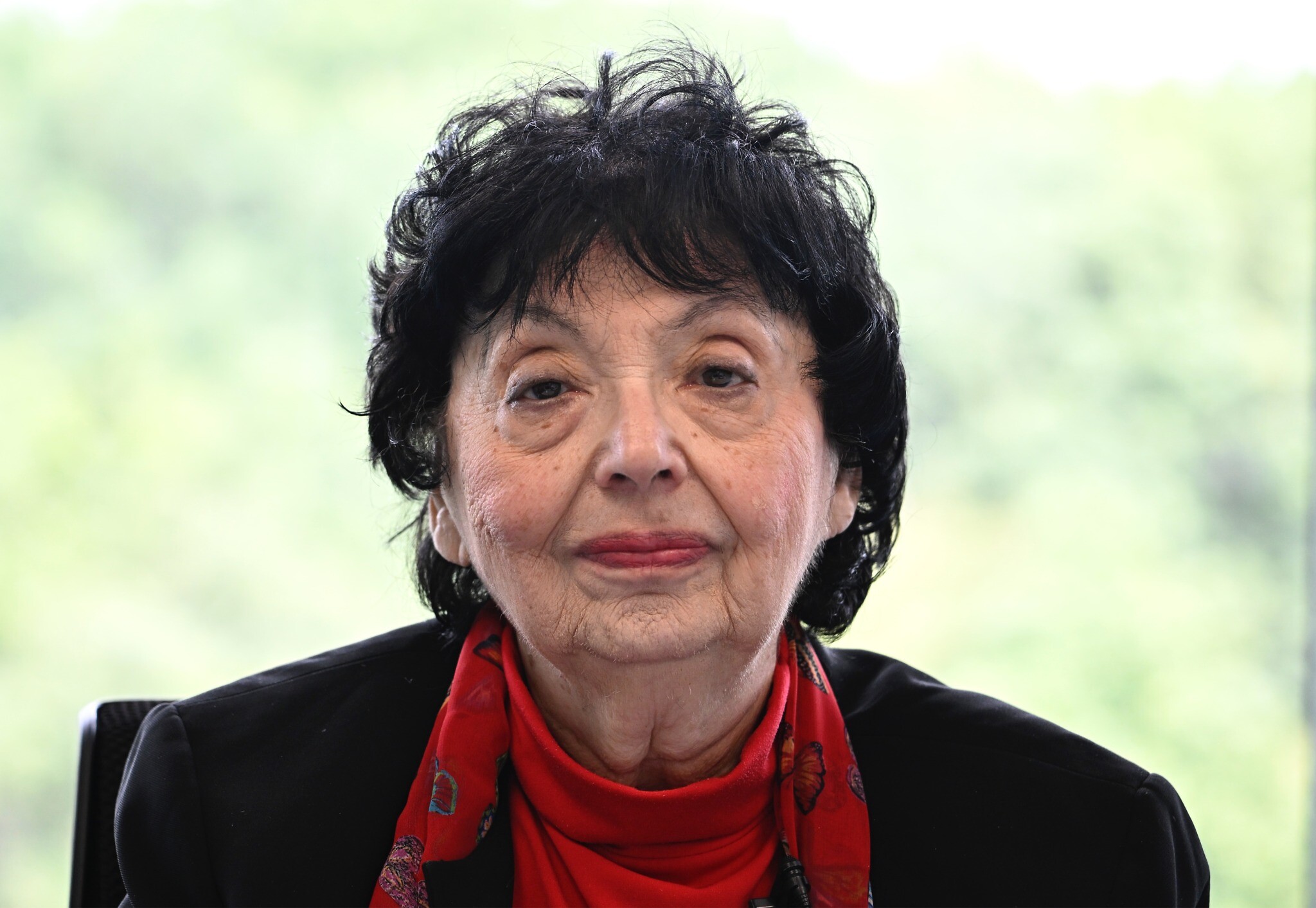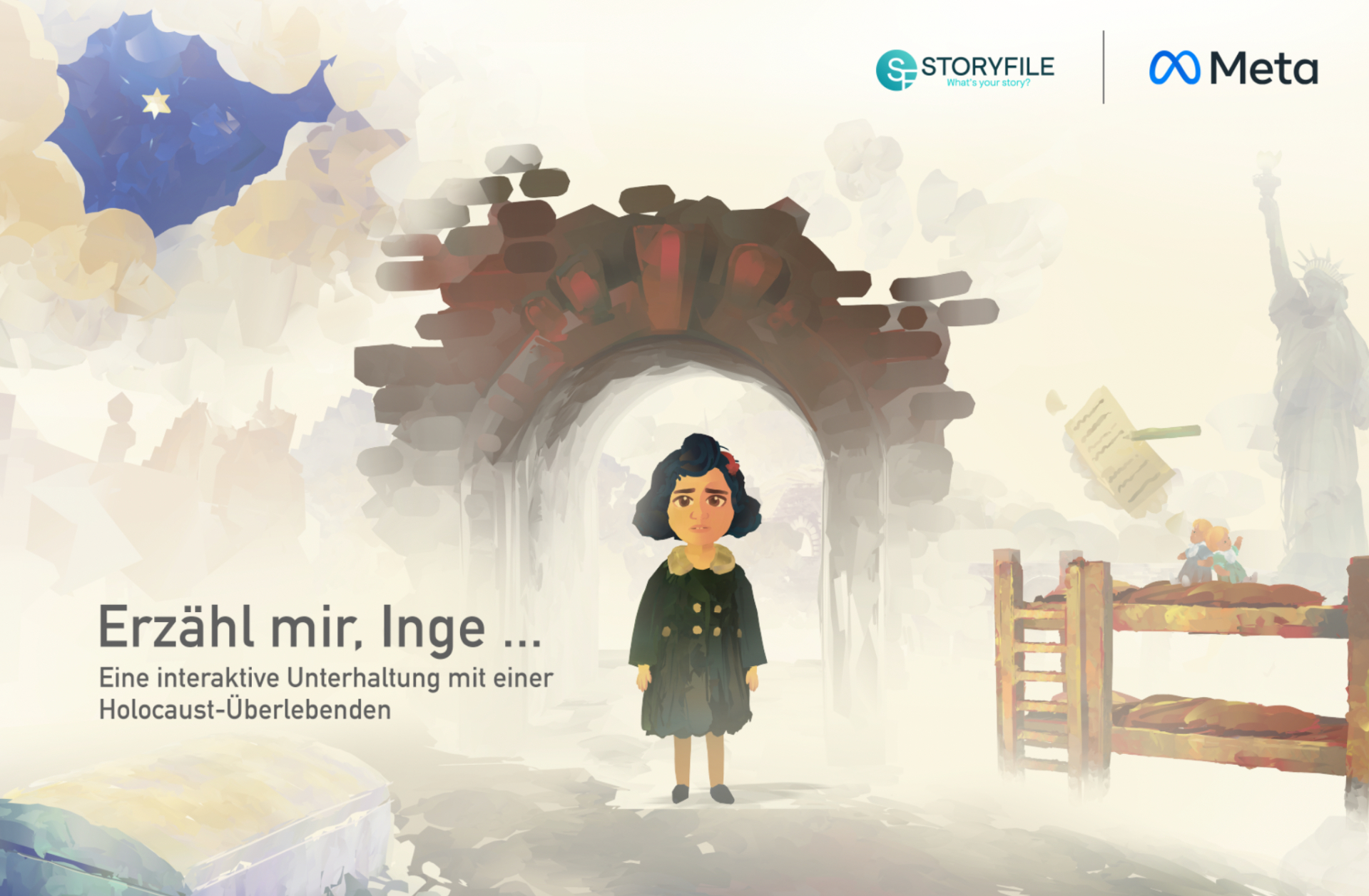Shoah education first as extended reality (XR) experience offers interaction with survivor
Companies Meta and StoryFile use video, AI (artificial intelligence) and 3D animations to bring alive Inge Auerbacher's experiences of Theresienstadt Ghetto

An innovative partnership has made it possible to use extended reality (XR) to interact with a Holocaust survivor.
“Tell me Inge…” centers around 88-year old Inge Auerbacher, who survived the Theresienstadt Ghetto as a 7 year-old girl. Her story has been brought to life via a collaboration between UNESCO, the World Jewish Congress, Meta (formerly known as Facebook) and StoryFile, a conversational video AI company.

“Tell me Inge…” is a 15 minute-long experience, during which viewers have the opportunity to ask Inge questions about the featured memories, from her childhood, her time in the Theresienstadt Ghetto and later memories from her adulthood and reflections on her survival.
It can be viewed either as a seated virtual reality (VR) experience with a headset, e.g. Meta Quest 2 or Pro, or via web browser, desktop or mobile. The experience is 100% free and is available in both German and English.
Auerbacher, who worked for nearly four decades as chemist, travelled from her home in New York to Berlin for two days of interviews, answering questions in both German and English to create a database of video files.
She said: “We all want to stay alive forever I think. My life is a miracle and it’s my obligation for being alive to help. My wish is for every child to grow up in peace without hunger or prejudice. Now, I’m not great with tech, but I love new ideas and we’re living in a different age. Children learn in a different way than I did, but you need to get them young! It has to be done with technology today. Let’s make it good stuff, make it interesting. Teach them in their voice and with the tech they want to learn it from. Teach them good things like tolerance to love!”

Stephen Smith, co-founder and CEO StoryFile, says he first got to know Inge, now a passionate Shoah educator, via Facebook: “Inge was NOT afraid to use technology to get her message across. She messaged me almost daily on Facebook messenger, eager to find the best technological solutions for telling her story. “I want to be one of those holograms”, she told me. She did not need to be persuaded to do any of this.”
He says Auerbacher “has committed the story of her childhood to enable younger learners to encounter her in XR – extended reality – which includes being able to view her story in Meta’s VR headset, Quest.”
Tell Me Inge, was, continues Smith, “developed with younger learners in mind. Inge was ten years old at the end of her three year ordeal in Terezin. We want young learners to be able to meet that little girl in XR on their screens and tablets, and in VR too, when it is safe for them to do so. We want them to be able to enter into her world, imagine her narrative, and learn with her face to face, from one generation to the next. We want her story to be a part of their story too.”
Julia Reuss, Public Policy Director Central Europe Meta, said: “There is tension and deep complexity between representing the Holocaust and using immersive technologies in order to do so. The intention of this project is never to hide the complexity, but to rather ask questions, to challenge assumptions, to engage, and to ultimately reflect on the experience. We are therefore immensely grateful to StoryFile, UNESCO and the World Jewish Congress for being such strong and reliable partners without whom we wouldn’t have been able to bring Inge’s story to life like this today.”
Felix Klein, Federal Government Commissioner for Jewish Life in Germany and the Fight against Anti-Semitism, said: “Everyone should consider what he or she can do to leave no room for anti-semitism and to keep the memory of the Shoah alive.”
Meta supported StoryFile with a grant that helped cover costs associated with the technical development, animation, and production process.
The experience is available online and free to a wide global audience via https://inge.storyfile.com

Thank you for helping to make Jewish News the leading source of news and opinion for the UK Jewish community. Today we're asking for your invaluable help to continue putting our community first in everything we do.
For as little as £5 a month you can help sustain the vital work we do in celebrating and standing up for Jewish life in Britain.
Jewish News holds our community together and keeps us connected. Like a synagogue, it’s where people turn to feel part of something bigger. It also proudly shows the rest of Britain the vibrancy and rich culture of modern Jewish life.
You can make a quick and easy one-off or monthly contribution of £5, £10, £20 or any other sum you’re comfortable with.
100% of your donation will help us continue celebrating our community, in all its dynamic diversity...
Engaging
Being a community platform means so much more than producing a newspaper and website. One of our proudest roles is media partnering with our invaluable charities to amplify the outstanding work they do to help us all.
Celebrating
There’s no shortage of oys in the world but Jewish News takes every opportunity to celebrate the joys too, through projects like Night of Heroes, 40 Under 40 and other compelling countdowns that make the community kvell with pride.
Pioneering
In the first collaboration between media outlets from different faiths, Jewish News worked with British Muslim TV and Church Times to produce a list of young activists leading the way on interfaith understanding.
Campaigning
Royal Mail issued a stamp honouring Holocaust hero Sir Nicholas Winton after a Jewish News campaign attracted more than 100,000 backers. Jewish Newsalso produces special editions of the paper highlighting pressing issues including mental health and Holocaust remembrance.
Easy access
In an age when news is readily accessible, Jewish News provides high-quality content free online and offline, removing any financial barriers to connecting people.
Voice of our community to wider society
The Jewish News team regularly appears on TV, radio and on the pages of the national press to comment on stories about the Jewish community. Easy access to the paper on the streets of London also means Jewish News provides an invaluable window into the community for the country at large.
We hope you agree all this is worth preserving.





















